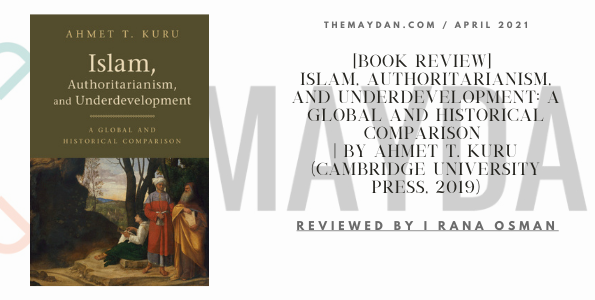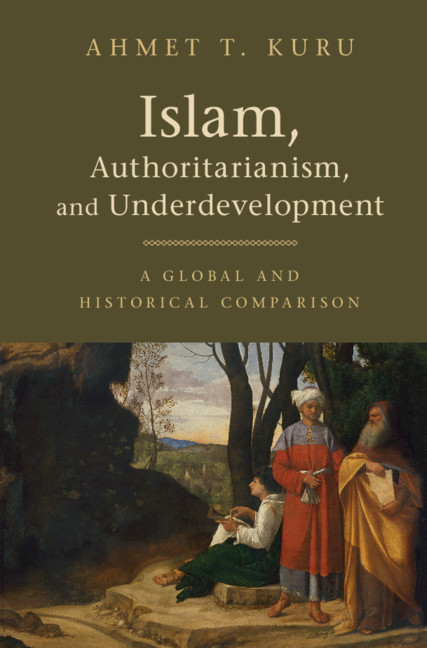
[Book Review] Islam, Authoritarianism, and Underdevelopment: A Global and Historical Comparison, by Ahmet T. Kuru (New York: Cambridge University Press, 2019). ISBN: 9781108296892; 303 pages. $34.99 | Reviewed by Rana Osman.
Islam, Authoritarianism, and Underdevelopment: A Global and Historical Comparison is an ambitious project that offers a closer look to a frequently asked question: why does authoritarianism reign supreme in most Muslim-majority countries today?
In a bold and thought-provoking inquiry, Ahmet T. Kuru, a professor of political science at the University of San Diego, identifies two co-dependent factors as the underlying cause of socio-economic underdevelopment in some Muslim-majority states: exclusionist religious ideology combined with military force or what he calls the “ulema-state alliance” (p. 3). He argues that this alliance has fueled the political patronage of social actors from the eleventh century to the present day and attempts to frame it as a non-doctrinal historical construct (pp. 94-104)—not “sacred and timeless” (p. 234).
From this viewpoint, Kuru expands on the conjugal nature between ideology and the state and charts how they interact to build a sense of mystification and grandeur around their ideological legitimacy. “The relations between religious, political, intellectual, and economic classes,” he maintains, “have been the main engine behind the changes and reversals between the levels of development in the Muslim world, as well as in Western Europe” (p. 3). This is treated through a comparative-historical method to investigate ideological constructs between early Muslim civilizations and “Western Christianity” (p. 2) from the eighth century to the twentieth century—a comparison built on the idea that they both shared powerful moments of ascension.
“….Islam, Authoritarianism, and Underdevelopment delivers a searing critique of “essentialist” (p. xv) approaches that frame Islam (as a religion) as the cause of long-lived experiences of political suppression and economic stagnation.”
Based on this historical perspective, Islam, Authoritarianism, and Underdevelopment delivers a searing critique of “essentialist” (p. xv) approaches that frame Islam (as a religion) as the cause of long-lived experiences of political suppression and economic stagnation. Kuru also criticizes views that overindulge in Western colonialism and ongoing imperialist exploitations. He argues that Muslim-majority societies had already experienced political and socio-economic crises before the mid-nineteenth century that were not entirely determined by external forces.
Aided with regional historical maps, recent surveys, and NGO reports that quantify geo-economic progress and regression in contemporary Muslim-majority states, Kuru’s originality lies in his interdisciplinary approaches. In an unconventional cross-sectional critical reading of global history, Kuru charts “ideational and material conditions in particular historical periods” (p. xiv), focusing on the determinative circumstances and formations of power relations in Western Christian and Muslim history. Further, the crux of Kuru’s argument builds on a deeper layer of the “new institutionalism approach” – a criterion that follows the trajectories of significant figures and their experiences that created and legitimized these institutions (i.e., Islam and the state). The usefulness of this historical and ideological comparison between civilizations, the author envisions, “may contribute to the construction of a new, democratic, and progressive relationship between Islam and the state today” (p. 235).
While one is compelled to group Islam, Authoritarianism, and Underdevelopment with works that address the implications of the modern state on Muslim polity, Kuru’s argument succinctly brings to the fore a juristic domain where pseudo-political legislative authority had implored within the ulamā’ class. In other words, long before the formation of the modern nation-state, Kuru points to a historical period where a coercive state was aided by juristic “literalist epistemological hierarchy” (p. 232) that impeded legal pluralism/interpretations. More specifically, Kuru articulates the impact of this strict state-sanctioned Sunni orthodoxy on the depreciation of creativity in medicine, engineering, and ultimately in juristic dynamism. He argues that the lack of competing interpretations has further marginalized the once-fluid creative power of religious scholars, including modern intellectuals. This is primarily due to state-sponsored criminalization of acts grounded in unreformed and inflexible epistemology (pp. 24, 104-111), such as apostasy.
“In other words, long before the formation of the modern nation-state, Kuru points to a historical period where a coercive state was aided by juristic “literalist epistemological hierarchy” (p. 232) that impeded legal pluralism/interpretations.”
Structurally, the book is divided into two parts.
Part I, entitled “Present,” addresses the contemporary context and circumstances in three chapters, while Part II, “History,” examines in great detail the impact of intellectual and material conditions that aided critical transformations in both civilizations. This review will address the latter as it constitutes the bulk of the author’s analysis. The first three chapters utilize empirical surveys and statistical data to compare the impact of authoritarian religious interpretations, Western colonialism, and state oppression on the manifestation of violence in some Muslim-majority states today. Through comparative constitutionalism methods, the author systematically debunks the correlation between secularism and democracy and Islam and authoritarianism by anchoring socio-economic factors that produce a “vicious circle” (p. 61) of ineffective ideologies that are rooted in history.
Part II simultaneously addresses multiple currents: the complexity of civilizations, moments of political pressures, and the functionality of the sociopolitical class. The remaining four chapters uniquely place Muslim societal experience alongside its Western Christian counterpart for an in-depth analysis vis-à-vis various historical, religious, and sociological factors. While neighboring empires “stratified feudalism and privileged aristocrats” (p. 88), early Muslim civilizations experienced non-social differentiation norms and decentralized state rule. This remained until the prosecution of the Prophet’s family members, which brought about a reversal of political normativity: pre-Islamic hereditary social organization and the religiously symbolic rule of the Umayyads onwards.
Furthermore, when “Europe was mostly under the hegemony of the clergy and military elite” (p. 69), merchants and scholars in the Islamic world of the eighth to eleventh centuries maintained their independence thanks to trade revenue. This enabled them to secure a sufficient degree of separation from the state.
Kuru maintains that in the late eleventh century, foreign military invasions of Muslim centers caused a critical ideological transformation in “Western Christian” lands and a reversal in the Muslim world in a period when political principles rang hollow, and the need for survival overpowered all other concerns. At this “critical juncture” (p. 101), the ulema concentrated their influential role on “ideational hegemony [which] met state violence to eliminate contenders” (p.89).
These circumstantial changes instituted an unchallenged alliance between an authoritarian juristic class that furnished a theological discourse for state allegiance and a state that instrumentalizes religious discourse through a degree of reciprocal legitimization. This alliance bore hierarchical characteristics that “weakened civil society in the Muslim world” (p. 197) and that, Kuru contends, explains how European powers could disrupt local institutions and “colonize most of the Muslim world” (p. 224). Further, he remarks, while Westernized-style top-down intellectual reforms achieved a degree of institutional developments, they primarily benefited a particular social class. Additionally, these reforms “did not succeed in bringing Muslim societies to Western levels of political and socio-economic development” (p. 225). Instead, these top-down reforms “restricted Muslims’ freedom to flourish and engendered reactionary anti-Western ideologies” (p. 224). The inherited epistemological authority created a forceful system of a politicized religion, where the ulema-state alliance feeds into the expansion of despotic political rule under the façade of religious legitimization.
“It is unclear whether Kuru acknowledges the different layers of scholar-ruler interactions in the contemporary world that continue to produce diverse power dynamics. For example, Kuru appears to neglect the increasing voices from creative jurists (p. 7, n. 12).”
It is unclear whether Kuru acknowledges the different layers of scholar-ruler interactions in the contemporary world that continue to produce diverse power dynamics. For example, Kuru appears to neglect the increasing voices from creative jurists (p. 7, n. 12). A prime case is Salman al-Auda, who epistemically attempts to conceptualize democratic values to limit the government sphere. Such voices do not speak in an ideal context of independence; nonetheless, they could very well be the beginning of a productive form of jurisprudential resistance.
Overall, this is a well-documented study that offers a fresh perspective on the history of the construction of the ulema-state alliance. The fifty-four-page bibliography may explain the author’s commitment to creating an inclusive approach to a global intellectual tradition. However, it is not clear why the author cites Hamza Yusuf Hanson (p.259) as a critical authority on al-Ghazali (d. 1111). There is also questionably bleak engagement with contemporary Muslim scholars from the Muslim world. If these edges were polished, Kuru’s arguments would spark a truly engaging dialogue in contemporary scholarship.


